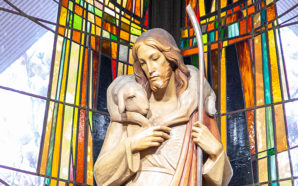On the 100th anniversary of the beatification Thérèse of Lisieux, a look at how the combative faith of the “Little Flower” can help the Church through the crisis it is experiencing today
When Pope Pius X introduced Thérèse of Lisieux‘s cause for beatification in 1914, he called her “the greatest saint of modern times”. But it was his successor, Pius XI, who had the honor of actually beatifying the French Carmelite nun commonly known in the English-speaking world as the “Little Flower”.
That beatification ceremony – which took place on April 29, 1923 – was followed two years later by Thérèse’s canonization by the same Pius XI.
Jean de Saint-Cheron, chief of staff in the rector’s office at the Institut Catholique of Paris, has written on the life and writings of the Little Flower. In this interview with La Croix‘s Florence Chatel, recently broadcast on Radio Notre-Dame, he explains why she and her example are still timely for people today.
La Croix: “People say Thérèse is syrupy, but she is also of blood”, the writer Gilbert Cesbron said of her. Is it this paradox that you wanted to address in your book?
Jean de Saint-Cheron: Thérèse is even less well known today than in Gilbert Cesbron’s time, and even less and less known outside of Catholic circles. I did a little survey while writing my book, and I realized that non-Catholics of my generation (35 years old, editor’s note) no longer know who she is, though they still know her name. For more than half a century, she has carried the totally false image of a wise girl writing love poems in her cozy bed.
At the beginning of the twentieth century, when the Story of a Soul was published, she was seen as something quite different, despite the alterations that the Carmelites made to her text. In the 1950s, when her manuscripts were published in their entirety, we discovered all the warlike fury of the little, yet very great, Thérèse.
The pinkish sediments which made her into this “syrup” of which Gilbert Cesbron speaks were deposited little by little in the collective imagination. But, as for the little girl who wrote sentimental notebooks, I have never met her.
I read her autobiographical manuscripts at the age of twenty, when I had no preconceived image of her. I was immediately struck by her humor, by her realism, by the darkness of her vision of earthly life. It was not pessimism, but an ability to point to sin and misfortune where they are, to speak of the unjust suffering of the innocent… Thérèse did not live in a world of little flowers and blue birds.
So this very young saint was not afraid to confront evil?
She was a realist, and she was not afraid to speak about evil, which was due to her prophetic character: the prophets are those who in the Scriptures point out the sin. But they are also, correlatively, those who call us to a higher, more perfect, more glorious and happier life than the earthly life we live.
Thérèse believed with all her soul in the possibility of happiness and love. She knew that if Jesus, her “lover”, placed in her heart an immense desire for happiness and love, it was so that this desire may be satisfied.
Blaise Pascal wrote: “Everyone seeks to be happy.” The desire for happiness is the common denominator of all men and women. For Thérèse, it is not illusory: happiness is really what we are made for.
If Jesus put it in our hearts, it was so that we would go to meet him, because only he can make us truly happy. She gradually discovered, in the course of her life, that the only way to happiness is to do God’s will, that is, to love, and that this cannot be done by our own strength, but that we need God’s grace.
How can her message help the Church today?
In the crisis that we are going through today, Thérèse’s message invites us, first of all, to recognize what is wrong. Let us abandon our blinders, let us not waste time pretending that all is well, to hold onto inconsistent, easy speeches that spiritualize to the extreme, but which do not recognize the effort needed to clean the Augean stable.
At the same time, let us be sure and certain that in this crisis, which is not the first that the Church is going through, we continue to be called, individually and collectively, to be saints. The Lord, in addition to his great commandment, “Love one another”, said, “It is through this love you will have for one another that you will be recognized as my disciples”.
This is what we need to concretely live in the Church. And it is only in this way that the Church can show the authentic face of God.
Thérèse fought a battle through prayer, asking for the conversion of others. She also fought against herself…
Indeed, a host of details and anecdotes show how she fought day by day against her own selfishness, against her narcissism, against her pride. She also fought against injustice and ingratitude.
Her answer was always love. Of course, there is no single recipe for living according to the Gospel. But Thérèse teaches us that no matter what our situation may be, married, single, religious, we always have the possibility to love. Even when wounded by others, we can respond to that wound with extra mercy. Even when we are tired, we can respond to the temptation of discouragement with small acts.
What anecdote can you tell to illustrate this?
During the hours of prayer in the chapel, Thérèse was annoyed by a sister who made little noises with her mouth while praying beside her. These disconcerted her so much that she came to detest this sister. She realized that the Lord was asking her to love her sisters, not to pray quietly in a perfect atmosphere.
So she made the effort to love that annoying noise. She began to listen to it. She said that it turned into a “lovely concert” that she spent her prayer hours offering to the Lord. It’s brilliant, and it’s funny.
She had great confidence in the power of her prayer…
Indeed, Henri Pranzini, that great criminal for whom she prayed a lot and who ended up asking to kiss the crucifix on his way to the scaffold, showed her, and she in turn teaches us, that God always answers us in one way or another.
She had prayed for him to confess. He did not, but he showed in other ways that he had returned to the Lord. Thérèse urges us to always persevere in prayer.
Reproduced with permission from La Croix International.








